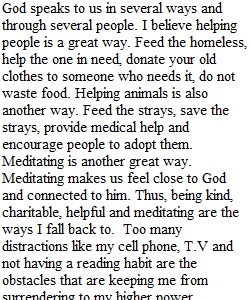


Q Getting Started So, if you are standing before the altar in the Temple, offering a sacrifice to God, and you suddenly remember that someone has something against you, leave your sacrifice there beside the altar. Go and be reconciled to that person. Then come and offer your sacrifice to God. Matthew 5:23–24 Some people make cutting remarks but the words of the wise bring healing. Proverbs 12:18 God created us to be in social relationships. It is within such relationships that we thrive fully as human beings. Yet these relationships can be inherently vexing. We must live with people, but we'd often prefer to live without them! Words spoken hastily are like sword thrusts. Each word that we utter is an important symbol of what is in our hearts. What do your words say about you? Do you use language as a sword to create pain or as a balm to promote healing? God gives us the gift of language to create those social relationships we need in order to survive. But often we use language as a means to disrupt those relationships, separating ourselves from our Creator. That is why Jesus reminds us in the Gospel that we must make peace with our neighbor before we may truly and appropriately worship God. Upon successful completion of this discussion, you will be able to: • Articulate a Christian perspective on the social world around you. • Practice Christian social responsibility in your daily social activities. ________________________________________ Background Information The author finds herself struggling to hear God. Walk with her on this authentic exploration of the part we play in our own spiritual development. ________________________________________ Instructions 1. Read Day Two of Wells, M. (2021) My Ramblings in the Silence: 21 Days of Silent Reflection with the Lord. 2. Review the rubric to make sure you understand the criteria for earning your grade. 3. Navigate to the threaded discussion and respond to the following prompts: a. How can I release the cares of the day so that I can hear God in the silence? b. What are the obstacles keeping me from surrendering to my higher power? c. What actions can I take in my life to care for my spirituality better? 4. Your initial post is due by the end of the fourth day of the workshop. It should be at least 250 words. 5. Read and respond to your classmates’ postings, as well as all instructor follow-up questions directed to you, by the end of the workshop. 6. Your postings should also: a. Be well developed by providing clear answers with evidence of critical thinking. b. Add greater depth to the discussion by introducing new ideas. c. Provide clarification to classmates’ questions and insight into the discussion. d. Be posted on three different days during the workshop.
View Related Questions